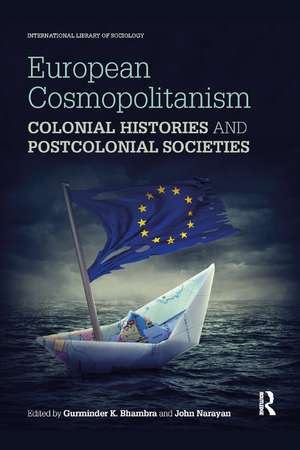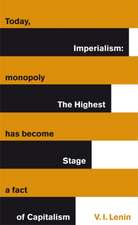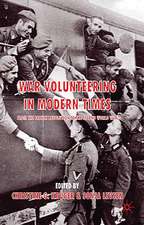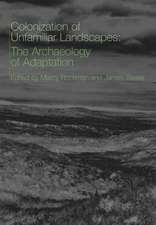European Cosmopolitanism: Colonial Histories and Postcolonial Societies: International Library of Sociology
Editat de Gurminder Bhambra, John Narayanen Limba Engleză Paperback – 12 dec 2019
| Toate formatele și edițiile | Preț | Express |
|---|---|---|
| Paperback (1) | 364.22 lei 3-5 săpt. | +22.67 lei 7-13 zile |
| Taylor & Francis – 12 dec 2019 | 364.22 lei 3-5 săpt. | +22.67 lei 7-13 zile |
| Hardback (1) | 1105.95 lei 3-5 săpt. | +19.05 lei 7-13 zile |
| Taylor & Francis – 7 noi 2016 | 1105.95 lei 3-5 săpt. | +19.05 lei 7-13 zile |
Din seria International Library of Sociology
-
 Preț: 394.62 lei
Preț: 394.62 lei -
 Preț: 358.40 lei
Preț: 358.40 lei - 15%
 Preț: 411.88 lei
Preț: 411.88 lei - 8%
 Preț: 382.16 lei
Preț: 382.16 lei - 33%
 Preț: 488.64 lei
Preț: 488.64 lei - 34%
 Preț: 1182.96 lei
Preț: 1182.96 lei - 37%
 Preț: 1181.31 lei
Preț: 1181.31 lei - 34%
 Preț: 1042.56 lei
Preț: 1042.56 lei - 31%
 Preț: 328.22 lei
Preț: 328.22 lei - 34%
 Preț: 1348.74 lei
Preț: 1348.74 lei - 34%
 Preț: 1045.20 lei
Preț: 1045.20 lei - 34%
 Preț: 1042.56 lei
Preț: 1042.56 lei - 37%
 Preț: 1404.44 lei
Preț: 1404.44 lei - 34%
 Preț: 1042.56 lei
Preț: 1042.56 lei - 34%
 Preț: 1042.98 lei
Preț: 1042.98 lei - 36%
 Preț: 1045.42 lei
Preț: 1045.42 lei - 37%
 Preț: 1182.54 lei
Preț: 1182.54 lei - 34%
 Preț: 1461.29 lei
Preț: 1461.29 lei -
 Preț: 446.53 lei
Preț: 446.53 lei - 34%
 Preț: 1042.68 lei
Preț: 1042.68 lei - 34%
 Preț: 1404.44 lei
Preț: 1404.44 lei - 34%
 Preț: 1962.29 lei
Preț: 1962.29 lei - 34%
 Preț: 1184.18 lei
Preț: 1184.18 lei - 34%
 Preț: 1042.56 lei
Preț: 1042.56 lei - 31%
 Preț: 352.95 lei
Preț: 352.95 lei - 34%
 Preț: 1407.29 lei
Preț: 1407.29 lei - 30%
 Preț: 332.87 lei
Preț: 332.87 lei - 37%
 Preț: 1350.78 lei
Preț: 1350.78 lei - 34%
 Preț: 1208.76 lei
Preț: 1208.76 lei - 34%
 Preț: 1348.74 lei
Preț: 1348.74 lei - 37%
 Preț: 1181.73 lei
Preț: 1181.73 lei - 34%
 Preț: 1182.96 lei
Preț: 1182.96 lei - 18%
 Preț: 1014.47 lei
Preț: 1014.47 lei - 34%
 Preț: 1185.47 lei
Preț: 1185.47 lei - 37%
 Preț: 1348.74 lei
Preț: 1348.74 lei - 30%
 Preț: 335.39 lei
Preț: 335.39 lei - 34%
 Preț: 1041.33 lei
Preț: 1041.33 lei - 29%
 Preț: 339.90 lei
Preț: 339.90 lei - 31%
 Preț: 341.46 lei
Preț: 341.46 lei - 34%
 Preț: 1043.58 lei
Preț: 1043.58 lei - 18%
 Preț: 1066.09 lei
Preț: 1066.09 lei - 37%
 Preț: 1180.11 lei
Preț: 1180.11 lei - 34%
 Preț: 1184.18 lei
Preț: 1184.18 lei - 34%
 Preț: 1683.16 lei
Preț: 1683.16 lei - 36%
 Preț: 1043.37 lei
Preț: 1043.37 lei - 30%
 Preț: 332.44 lei
Preț: 332.44 lei - 30%
 Preț: 358.44 lei
Preț: 358.44 lei
Preț: 364.22 lei
Nou
Puncte Express: 546
Preț estimativ în valută:
69.69€ • 72.76$ • 57.68£
69.69€ • 72.76$ • 57.68£
Carte disponibilă
Livrare economică 14-28 martie
Livrare express 28 februarie-06 martie pentru 32.66 lei
Preluare comenzi: 021 569.72.76
Specificații
ISBN-13: 9780367875404
ISBN-10: 0367875403
Pagini: 200
Dimensiuni: 156 x 234 x 15 mm
Greutate: 0.45 kg
Ediția:1
Editura: Taylor & Francis
Colecția Routledge
Seria International Library of Sociology
Locul publicării:Oxford, United Kingdom
ISBN-10: 0367875403
Pagini: 200
Dimensiuni: 156 x 234 x 15 mm
Greutate: 0.45 kg
Ediția:1
Editura: Taylor & Francis
Colecția Routledge
Seria International Library of Sociology
Locul publicării:Oxford, United Kingdom
Public țintă
Postgraduate and UndergraduateCuprins
Introduction
1. Colonial Histories and the Postcolonial Present of European Cosmopolitanism , (Gurminder K Bhambra and John Narayan)
Part I: Theorizing European Cosmopolitanism Otherwise
2. Cosmopolitan Europe: Memory, Apology and Mourning, (Meyda Yeğenoğlu)
3. Ah, We Have Not Forgotten Ethiopia: Anti-Colonial Sentiments for Spain in a Fascist Era, (Robbie Shilliam)
4. Communist Cosmopolitanism, (William Outhwaite and Larry Ray)
Part II: Alternative Historical Groundings of Cosmopolitanisms in Europe
5. Always Already Cosmopolitan – Indigenous Peoples and Swedish Modernity, (Gunlög Fur)
6. The Early Modern Spanish Monarchy and European Cosmopolitanism, (M. J. Rodriguez-Salgado)
7. The Cosmopolitan Caribbean Spirit and Europe, (Shantelle George)
Part III: Contemporary Postcolonial Cosmopolitanisms
8. Rethinking Cosmopolitanism, Multiculturalism and Diaspora via the Diasporic Cosmopolitanism of Europe’s Kurds, (Ipek Demir)
9. Europe is over! Afro-European Mobilities, Former Colonial Metropoles, and New Cosmopolitanisms, (Sarah Demart)
10. Fanon’s Decolonized Europe: The Double Promise of Coloured Cosmopolitanism in the Age of Austerity, (John Narayan)
11. EPILOGUE: A New Vision of Europe: Learning from the South, (Boaventura de Sousa Santos)
1. Colonial Histories and the Postcolonial Present of European Cosmopolitanism , (Gurminder K Bhambra and John Narayan)
Part I: Theorizing European Cosmopolitanism Otherwise
2. Cosmopolitan Europe: Memory, Apology and Mourning, (Meyda Yeğenoğlu)
3. Ah, We Have Not Forgotten Ethiopia: Anti-Colonial Sentiments for Spain in a Fascist Era, (Robbie Shilliam)
4. Communist Cosmopolitanism, (William Outhwaite and Larry Ray)
Part II: Alternative Historical Groundings of Cosmopolitanisms in Europe
5. Always Already Cosmopolitan – Indigenous Peoples and Swedish Modernity, (Gunlög Fur)
6. The Early Modern Spanish Monarchy and European Cosmopolitanism, (M. J. Rodriguez-Salgado)
7. The Cosmopolitan Caribbean Spirit and Europe, (Shantelle George)
Part III: Contemporary Postcolonial Cosmopolitanisms
8. Rethinking Cosmopolitanism, Multiculturalism and Diaspora via the Diasporic Cosmopolitanism of Europe’s Kurds, (Ipek Demir)
9. Europe is over! Afro-European Mobilities, Former Colonial Metropoles, and New Cosmopolitanisms, (Sarah Demart)
10. Fanon’s Decolonized Europe: The Double Promise of Coloured Cosmopolitanism in the Age of Austerity, (John Narayan)
11. EPILOGUE: A New Vision of Europe: Learning from the South, (Boaventura de Sousa Santos)
Notă biografică
Gurminder K. Bhambra is Professor and Research Director of Sociology at the University of Warwick and Guest Professor of Sociology and History at the Centre for Concurrences in Colonial and Postcolonial Studies, Linnaeus University, Sweden. She is author of Rethinking Modernity: Postcolonialism and the Sociological Imagination, which won the 2008 Philip Abrams Memorial Prize for best first book in Sociology, and Connected Sociologies.
John Narayan is a Leverhulme Early Career Fellow in the Department of Sociology at the University of Warwick. His research interests are in the fields of globalisation, pragmatism and post-colonialism. He is the author of John Dewey: The Global Public and its Problems.
John Narayan is a Leverhulme Early Career Fellow in the Department of Sociology at the University of Warwick. His research interests are in the fields of globalisation, pragmatism and post-colonialism. He is the author of John Dewey: The Global Public and its Problems.
Recenzii
In sharp contrast to the anti-historical, methodological Eurocentrism that has permeated the greater part of scholarly work on ‘Cosmopolitan Europe’, this book applies a rare, let’s call it, methodological cosmopolitanism to its subject matter. In so doing, it not only successfully challenges numerous assumptions and claims concerning the cosmopolitanism in and of Europe (and vice versa). As the book’s contributions amply testify, it also opens the door to a new, highly enlightening and thus utterly central empirical terrain for the field. This book is an achievement that should define the context for future research and intellectual debate.
—Peo Hansen, Professor of Political Science at REMESO, Linköping University
At a time when the EU political project has been called into question as never before in its history, Bhambra and Narayan’s edited collection offers an insightful exploration of the hidden histories that have shaped cosmopolitan Europe, but are largely omitted by its historical canon. By recovering silenced histories, the book provides us with a novel perspective as well as expanded resources with which to address the challenges of our contemporary society.
— Nando Sigona, Birmingham Fellow, Senior Lecturer and Deputy Director of IRiS, Univeristy of Birmingham
This book makes a bold and crucial intervention. It simultaneously challenges the complacencies of elite European self-understandings, whereby an official ideology of European cosmopolitanism in fact reinstates postcolonial historical denial and Eurocentric insularity and excavates the richly cosmopolitan histories of imperial Europe’s inseparability from anti-colonial cosmopolitanisms, that go beyond ‘Europe’. The critical insight and rigor of this collection is indispensable for any serious reflection on the questions of ‘Europe’ and cosmopolitanism.
—Nicholas De Genova, Reader in Human Geography, King’s C
—Peo Hansen, Professor of Political Science at REMESO, Linköping University
At a time when the EU political project has been called into question as never before in its history, Bhambra and Narayan’s edited collection offers an insightful exploration of the hidden histories that have shaped cosmopolitan Europe, but are largely omitted by its historical canon. By recovering silenced histories, the book provides us with a novel perspective as well as expanded resources with which to address the challenges of our contemporary society.
— Nando Sigona, Birmingham Fellow, Senior Lecturer and Deputy Director of IRiS, Univeristy of Birmingham
This book makes a bold and crucial intervention. It simultaneously challenges the complacencies of elite European self-understandings, whereby an official ideology of European cosmopolitanism in fact reinstates postcolonial historical denial and Eurocentric insularity and excavates the richly cosmopolitan histories of imperial Europe’s inseparability from anti-colonial cosmopolitanisms, that go beyond ‘Europe’. The critical insight and rigor of this collection is indispensable for any serious reflection on the questions of ‘Europe’ and cosmopolitanism.
—Nicholas De Genova, Reader in Human Geography, King’s C
Descriere
This book examines the cosmopolitan project of post-war Europe and offers a postcolonial appraisal of its recent history. The focus is not on pluralising the narratives of Europe, but with forging an understanding of European cosmopolitanism – of history, identity, politics – more adequate to its colonial past and present multicultural constitue















